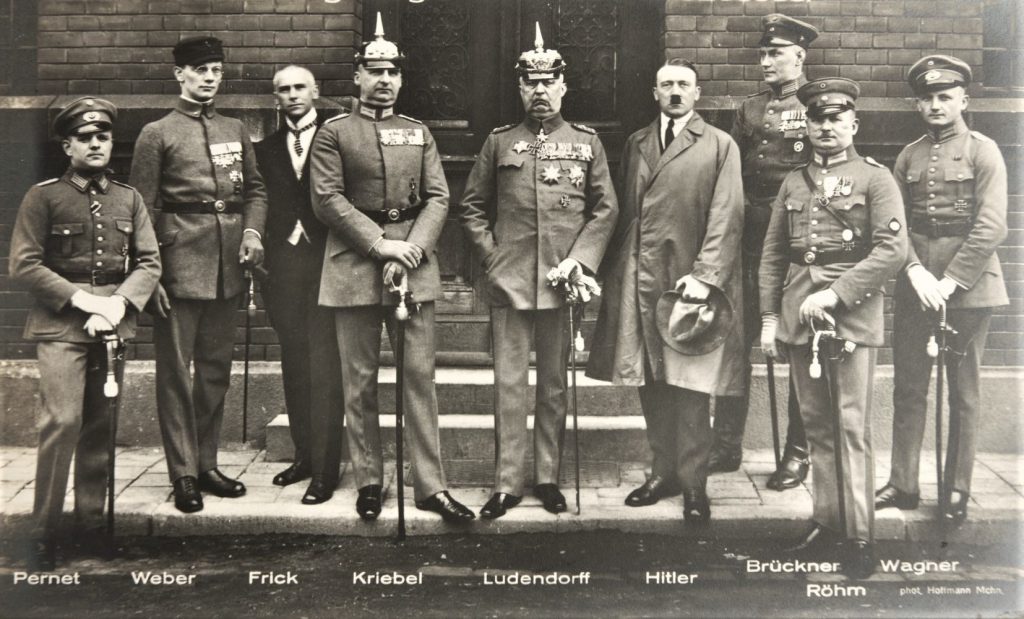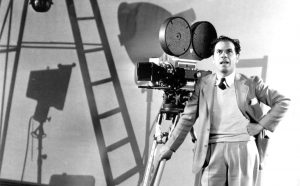On November 8, 1923, at around 8:30 pm, Adolf Hitler and his armed bodyguards of the SA surrounded the Bürgerbräukeller Beer Hall in Munich, Germany. Along with his bodyguards, when Hitler barged into the Beer Hall, he immediately fired his gun into the ceiling and shouted, “The National Revolution has begun. This building is occupied by six hundred heavily armed men. No one may leave the hall. Unless there is immediate quiet I shall have a machine gun posted in the gallery.”1 Hitler proclaimed that both the Bavarian and German Reich governments had been removed and there was now a provisional government being set up. Many of those present in the Beer Hall did not know what to believe. One thing that they were sure of was that the rifles and machine guns were real, so some followed Hitler’s orders. Though many were in amazement, there were some businessmen who were very upset, and one that even yelled for Hitler to shoot. However, others feared for their lives, afraid that a massacre was about to occur.2

The event underway has come to be called the Beer Hall Putsch. A Putsch is simply the German word for a military takeover of the government, or, in French, a coup d’etat.3 The idea for this Putsch came to Hitler from Benito Mussolini, who had staged a triumphant March on Rome in 1922, just the year before. Many of Mussolini’s followers were lower-middle-class Italians, and with their help, he threatened to take over the Italian government with his Fascist march on Rome. Like other Italian populist leaders before him, he put his reputation at risk in order to obtain power. If Mussolini’s march were to fail, he could lose his status in society, along with his respect.4 Mussolini’s first step was to create his own government. Without one, he would have no means to take over; so fascist militias and thugs began gathering from all over Italy.5 Once Mussolini gained power, he began to turn Italy into a Fascist state.6 Hitler imagined orchestrating a similar March on Rome that would start for Berlin from Munich’s famous Odeonsplatz the following morning, November 9, 1923. Odeonsplatz was just a few blocks away from the Bürgerbräukeller Beer Hall where Hitler and his assembled men had gathered that night.7

Through the Beer Hall, Hitler managed to push his way to the front of the hall where he took charge of the crowd. “He then ordered the Bavarian triumvirate—von Lossow, von Seisser, and von Kahr—into an adjoining room, where he bullied them at gunpoint into backing his putsch.”8 The three men were all government officials: Lossow was a general major, Kahr was the Minister President of Bavaria and Colonel, and Seisser was head of the Bavarian state police. Though they were already government officials, Hitler apologized to the men for the interruption on their speech and made a promise to them that they would have good jobs while he was in power. Hitler wanted the triumvirate on his side so that his Putsch would have the backing of actual government officials. However, when he tried to scare the three men into supporting the coup, it didn’t quite work, and they refused to talk or give any information that would give Hitler confidence that he had turned them. He then waved his pistol at them and shouted, “I have four shots in my pistol! Three for you, gentlemen. The last bullet for myself!”9 Though he really didn’t have their full support, Hitler believed he did. Once he thought he had the officials in control, Hitler would return to the crowd and give a speech. The audience went crazy over the speech. Their enthusiasm showed Hitler that he had already won them over. With Ludendorff being around as well, he had their support even more, because Ludendorff was respected and very well-known. Hitler’s first few steps had been made and the Putsch was, so far, going as planned, or so he thought.
So by this point, the Putsch had officially begun, and even though it had just begun, many problems were already occurring for Hitler. One way that Hitler planned for his Putsch to work was by seizing communication centers and state offices in Munich, and using the triumvirate to coordinate the military and police efforts to come. “While the rebels temporarily took over some offices, including the municipal headquarters of the Reichswehr and Munich police headquarters, they failed to secure other key centers.”10 The telegraph office was one key center they failed to seize, which allowed for news of the Putsch to get to Berlin and for orders to be received from General von Seeckt at Berlin military headquarters.11

The triumvirate, which were the three government officials, was left to Erich von Ludendorff to deal with. Ludendorff was currently Deputy Chief of Staff to the German Second Army under General Karl von Bülow. But more importantly, Ludendorff had been one of the most important generals for Germany during the first World War, and was hailed by many Germans as not only a war hero, but also as one of the most patriotic Germans of the day. Because Ludendorff was in such a high position in the army, Hitler wanted to use him as a figurehead in the march and even asked him to lead it. Ludendorff was also able to convince the triumvirate to follow Hitler’s orders, and in return, Hitler would give them the political roles that they wanted in the future government. Ludendorff then freed them, and once they were free, they immediately began planning to respond to the Putsch. Since Hitler and his followers had failed to seize all key centers, such as the ones in the city, the triumvirate was able to call suburban troops and police to Munich. Because these authorities knew what Hitler was doing, they planned well to meet him and his troops in the morning. In the time that they planned out what they would do, Hitler doubted for several hours whether he should continue the march to Berlin, because he found out about the betrayal of the triumvirate. Hitler delayed the start of the march for so long that the Bavarian authorities knew exactly what to do to defend Munich.12
“In a last ditch effort to rally citizens and soldiers, Hitler led around 2,000 Nazis and other Kampfbund members in a march to the Feldherrnhalle on the Ludwigsstrasse.”13 When the march reached Odeonsplatz, the marchers and Munich law enforcement met. There was a shootout where fourteen Nazis and four police were left dead at the scene; however, the march completely ended there and all the rebels fled from the scene. Later on, another two Nazis died, with the march being a complete failure.14
Eventually, Ludendorff was not charged at all, whereas Hitler was put on trial for treason and found guilty. “Hitler was sentenced to five years imprisonment in the old fortress of Landsberg and was eligible for parole after serving six months.”15 He was sent to jail on April 1, 1924, and was released a little less than nine months later, on December 20. Though many would think being imprisoned was terribly bad, Hitler, unlike many, received special treatments and in just the few months that he was incarcerated he was allowed frequent and constant visitations. During that time, he also wrote his manifesto, Mein Kampf.16 What did Hitler learn from this episode of the Beer Hall Putsch? He learned that if you want to take power in Germany, a Putsch is not the way. Beginning in his Landsberg prison cell Hitler began plotting his next move. He would come to power in Germany, not through an illegal Putsch, but through the legal means of the ballot box.
- William L. Shirer, The Rise and Fall of the Third Reich (New York: Simon and Schuster, 1960), 68. ↵
- William L. Shirer, The Rise and Fall of the Third Reich (New York: Simon and Schuster, 1960), 68. ↵
- ”Holocaust Encyclopedia (DC: Washington), s.v. “Beer Hall Putsch (Munich Putsch).” ↵
- Jennifer Stock, “Benito Mussolini Marches on Rome,” Global Events: Milestone Events Throughout History, Vol. 4: 339. ↵
- Jennifer Stock,”Global Events: Milestone Events Throughout History, Vol. 4, “Benito Mussolini Marches on Rome,” 2017: 339. ↵
- Gale Encyclopedia of American Law, 2010, s.v. “Benito Mussolini,” by Donna Batten. ↵
- Charles Keserich, “The Fiftieth Year of “March on Rome”: Recent Interpretation of Fascism,” The History Teacher, Vol. 6. No. 1 (Nov 1972): 135. ↵
- Holocaust Encyclopedia (DC: Washington), s.v. “Beer Hall Putsch (Munich Putsch).” ↵
- Ian Kershaw, Hitler: A biography (Wells Street, London: W.W. Norton Company, 2008), 128. ↵
- ”Holocaust Encyclopedia (DC: Washington), s.v. “Beer Hall Putsch (Munich Putsch).” ↵
- William L. Shirer, The Rise and Fall of the Third Reich (New York: Simon and Schuster, 1960), 71. ↵
- ”Holocaust Encyclopedia (DC: Washington), s.v., “Beer Hall Putsch (Munich Putsch).” ↵
- Holocaust Encyclopedia (DC: Washington), s.v. “Beer Hall Putsch (Munich Putsch).” ↵
- Holocaust Encyclopedia (DC: Washington), s.v., “Beer Hall Putsch (Munich Putsch).” ↵
- William L. Shirer, The Rise and Fall of the Third Reich (New York: Simon and Schuster, 1960), 78. ↵
- William L. Shirer, The Rise and Fall of the Third Reich (New York: Simon and Schuster, 1960), 78. ↵



54 comments
Karla Fabian
This was a very detailed article about the failure of the Beer Hall Putsch. The detail put into this article makes it come to life. It was very intriguing to read that Ludendorff betrayed Hitler and still got away with it. We can recognize how Hitler, on the other hand, got put intro trial for treason and was found guilty. But also know how the punishments put onto Hitler were not harsh since he was allowed visitors and received unique treatments. Also, it was very intriguing to know that Hitler got to write his manifesto, Mein Kampf, which was very widespread as it converted to be the bible of National Socialism or Nazism in Germany’s Third Reich. In actuality, we can see how this book is banned from several countries, like in Bavaria, where it is not allowed by any copyright holder to print and distribute. Also, it is very intriguing to see how this event was considered a failure; it still was one of the turning points that led Hitler to power since he uses his time in prison to plan his next move.
Christopher Hohman
Nice article! It is interesting how Hitler’s first attempt to seize power in Germany failed because he was betrayed by Ludendorff and the other three high ranking Munich officials/officers. He was sentenced to five years in prison for treason, but I guess I will always wonder what would have become of the world if he had been executed for his crimes. Perhaps many lives could have been saved. It also seems like Hitler learned a great deal about power in Germany. Through his initial failure he learned that the best way to rise to power was through legal means such as the ballot box. The ending of this article does an excellent job of setting up future events, namely Hitler’s legal rise to power in the early 1930s.
Mia Gonzales
Hi Dayna! Thank you so much for this article!
Your writing provides insight into the realities of Hitler’s rise to power in the 1930s which many have been forgotten due to the focus primarily being on his successes. Your article truly brought this event back to life for an entirely new generation to experience and analyze through a historical lens and portrays Hitler in such an animated style that many new historians aren’t used to yet.
Monserrat Garcia
This article is so interesting because it gives background information on how Hitler became so powerful. Like anyone else, he had his failed trials which make the reader think about what would have happened if he continued failing to gain recognition and validation. The imagery is also very vivid in this article which makes it even more intriguing. I did not know about these events and it makes me wonder about different history would have played out if the bystanders had intervened.
Kimberly Rubio
I enjoyed reading this article. It was extremely informative. I learned a lot about Adolf Hitler’s first attempt at gaining power. It is unfortunate that he learned a great deal from this failed attempt, including to gain power by way of the ballot box rather than force. I am surprised so many people disregarded this event and voted for him. However, he was saying exactly what they wanted to hear, which won him votes.
Emilia Caballero Carmona
Hey Dayna, you did such a good job in writing your article! I enjoyed reading it and learning about the failed Putsch at Beer Hall in Germany. This was so interesting to me because I had never heard or learned about it back in high school when learning about Hitler and the Nazis. It was surprising to learn how the events of November 8, 1923 unfolded and how much of a fail they were.
Seth Roen
This is an excellent article about a relatively unknown part of Hilter’s first attempt to gain power. History is composed of little moments such as the Beer Hall Putsch that seem irrelevant then but essential later. If it were not for Hilter’s failure and arrest, he would not have had time to write his book and gain a following further on and achieve the Chancellors’ position in 1936. Little moments like that either reward or cost the world significantly.
Sara Guerrero
Reading for the first time about the Beer Hall Putsch it was very entertaining because I had no idea Hitler tried to gain power in such a forceful way. Although he failed I don’t think Hitler saw it as a failure but instead he learned and who knew that it would be the beginning of reign. In jail I think he had enough time to reflect on other ways he was going to gain power and he did it through ballots which was really the only way he was going to win.
Hali Garcia
Great job, this is a very interesting article and I really enjoyed reading it. I have never heard of the Beer Hall Putsch and I think I should have. It was interesting to read how he used Mussolini’s march to Rome as inspiration to gain his power and take over. What struck me was how he first used violence and threatened three powerful leader into supporting him. I thought it was interesting how he was imprisoned but received special treatment.
Antonio Holverstott
Hitler’s failure at overthrowing the Weimar Republic in the early 1920s was the stepping stone to his rise to power and the formation of Nazi Germany during the 1930s. The light sentence he received for his attempted violent removal of the republic and the special treatment he was given by wardens at his prison along with his analysis of national politics encouraged Hitler to try again to gain power.